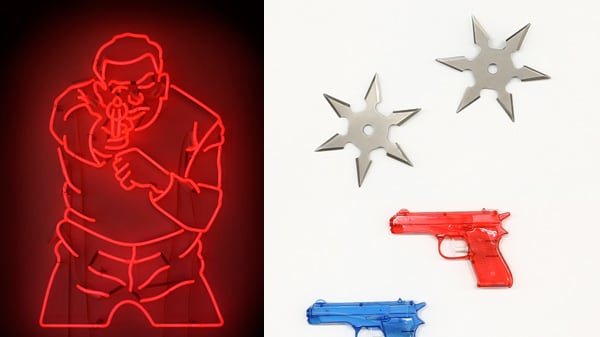Quick, what do the following have in common: a water gun, a Taser, a Bambi snow globe. For one, each can be purchased on Amazon with a single click. But more important, all three are also forbidden in airplane carry-ons by the Transportation Security Administration.
Now, with 18 other objects prohibited by the TSA, they constitute the subject matter of the Museum of Contemporary Art Denver’s Guarded exhibition, an installation that explores concepts of surveillance, fear, and control in a post-9/11 United States, opening March 30.
Artists Adam Ames and Andrew Bordwin, collectively called Type A, gathered inspiration from the often unquestioned authoritative measures imposed on the public. The artists argue that, as the TSA creates an environment of fear surrounding their infamous "Prohibited Items" list, individuals are subjected to the power bestowed on the items.
In the gallery space, the pieces sit on individual platforms suspended 12 feet above the ground, hidden from viewers. Each has a camera diligently pointed toward it, as though its mere presence arouses suspicion. Below, seven glowing security monitors pulse steadily, changing every few seconds to display one of the items at random. Any juxtaposition between them is arbitrary, encouraging viewers to draw their own conclusions and connections within the collection, whether funny, frightening, or just odd (e.g., throwing stars and nunchucks, the “martial arts” weapons the TSA specifically bans). The camera feeds are the only proof that viewers have of the objects above their heads. This requires faith that what's being broadcast is accurate.
To emphasize the theme of surveillance, an actual, living guard watches over the room during opening hours. Behind the post, to further drive the idea of a nation under supervision, three neon outlines of guards, together called Target, hang on the wall, each in either red, white, or blue. Eight enlarged photographs of spent bullets cover the exterior of the space, turning what was once threatening into something aesthetically interesting.

The associate curator of MCA, Nora Burnett Abrams, believes Type A’s art, in demonstrating an interest in the world around them, rather than waxing esoteric, is a perfect match for the museum. “We strive for exhibitions that relate to contemporary experiences,” she said, “Nothing is ever aloof, rather everything is rooted in some kind of common place.” With Guarded, “the audience can apply, or relate to, some of the questions being posed.”
Indeed, who hasn’t had a hard time at the airport? The intelligibility of the exhibition allows visitors to engage with the issues under debate. Meanwhile, the sardonic sense of humor, seen with the exaggerated element of the guards (both real and neon) and the contrast of items like a water gun with a real gun, might remind us that, despite the paranoia of the system in place, we are all (probably) going to be OK.






